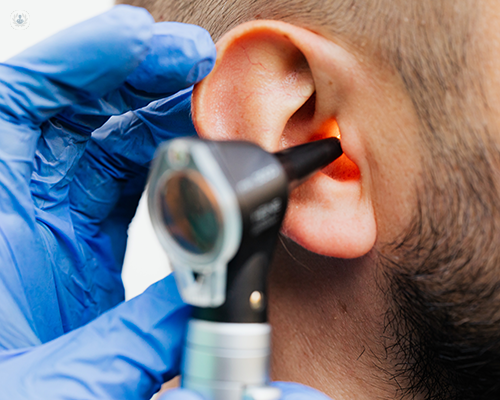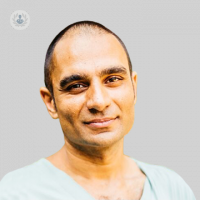Understanding hearing loss: Signs, causes and treatment
Written by:Hearing loss is common. It can affect one or both ears, be temporary or permanent, and range from mild to profound, making it difficult to hear speech and sounds. Whilst some types of hearing loss are gradual, others can occur suddenly without warning.
Here, Professor Mahmood Bhutta, highly skilled consultant ENT surgeon, provides an expert insight into hearing loss, including signs, causes and treatment.

What are the first signs of hearing loss?
In some cases, hearing loss has been present for some time and people are aware that they have hearing difficulties.
In other cases, however, hearing loss comes on slowly. People might start to notice that they are struggling to hear in certain conversations or that they may be missing words. People might unconsciously increase the volume of their TV or realise that they are having trouble concentrating in work meetings.
These signs point to possible hearing loss. People who are having problems with their hearing should see a specialist as soon as possible to get their hearing tested.
What are the most common causes of hearing loss?
When it comes to hearing loss, I think it is useful to first think about sound.
Sound is a vibration; it travels down the ear canal and moves deep inside until it hits the eardrum, causing the eardrum to vibrate. Attached to the eardrum is the middle ear, which contains the three little bones of hearing. When sound hits the eardrum, the three little bones vibrate in sequence and send the sound vibration into the cochlea, a fluid-filled structure deep inside the ear where sound is detected, and then sent by signals to the brain. The different types of hearing loss can affect any of these structures.
The typical problems involved in hearing loss include:
- A problem with the eardrum itself. For example, a hole in the eardrum, or the eardrum getting sucked in and deformed as a result of previous ear infections.
- Glue ear, which is fluid deep inside the eardrum. This is very common in children, but it can also happen in adults.
- A problem with the three little bones of hearing, particularly with the second bone, as a result of repeated ear infections.
- Otosclerosis, which is a disorder that occurs when the third bone of hearing (called the stapes) fuses with other parts of the ear.
- A problem with the cochlea, which is the deepest part of the ear. Damage to the cochlea is typically the cause of age-related hearing loss that occurs over time. Age-related hearing loss can be genetically determined, meaning that some people will develop it early age and others later on.
At what age do most people start to experience hearing loss?
The age at which people will experience hearing loss can vary.
If there is a problem with the cochlea, then hearing loss is usually something that appears in old age. Typically, people around the age of 60 or 70 will start to notice that their hearing is gone to the point where they are struggling.
Despite this, hearing actually starts to deteriorate from the age of 16, which explains why children can sometimes hear very high-frequency sounds that adults cannot detect. Still, hearing loss is very, very variable if it is age-related, and I have seen people who even in their 30s and 40s have started to develop hearing loss. Equally, I have seen people in their 80s and 90s with very good hearing.
If there is a problem with the middle ear (involving the eardrum or the bones of hearing), again, hearing loss is quite variable. However, often, this type of hearing loss will occur at a much younger age as a result of ear infections during infancy that caused damage to the eardrum or to the three bones of hearing. The extent of this damage may be present in children and in young adults.
Lastly, problems with the bones of hearing (involving otosclerosis) typically seem to be noticed around the age of 30 or 40.
Thus, there are different causes of hearing loss at different ages.
What conditions could cause sudden hearing loss?
Sudden hearing loss, where hearing disappears altogether, can sometimes occur following a cold when, for example, fluid builds up inside of the ear. However, people usually start to notice this occurring rather than it developing suddenly.
Other cases of sudden hearing loss occur when hearing disappears completely and extremely quickly, over the space of minutes or even hours. This is actually an emergency, because it likely means that a virus has invaded the ear. In these cases, evidence suggests that steroids should be used as a treatment to improve the chances of recovery, which might be given by mouth or by injection into the eardrum to try and recover hearing. This is because, unfortunately, in one-third of cases, hearing will never return. When this occurs, every treatment option will need to be used to try to recover the hearing that was lost.
Can you regain hearing?
It is possible to try and regain hearing, or to try and fix problems with hearing. This will depend on the cause of hearing loss.
If there is a problem with the deepest part of the ear, then a hearing aid may be the best option to try and overcome what has been lost. A hearing aid is not the perfect solution - ENT specialists are aware - because it cannot replace what nature naturally gave. A hearing aid, in particular, is also not very good at picking out sounds from background environments. Nevertheless, what is important here is to know that there are options available to manage hearing loss.
Certainly, if there is a problem with a hole in the eardrum, with a sucked-in eardrum, or with an eroded bone (where the bones are damaged or the bone is fixed) then surgery may be an option as well to repair the eardrum and repair the bones of hearing with small artificial bones.
A specialist will help to determine what is the underlying cause of each patient’s hearing loss and what the management options may be.
Professor Mahmood Bhutta is a highly skilled consultant ENT surgeon with more than 20 years of experience.
If you have started to notice a decline in your ability to hear recently, do not hesitate to visit Professor Bhutta’s Top Doctors profile today.


